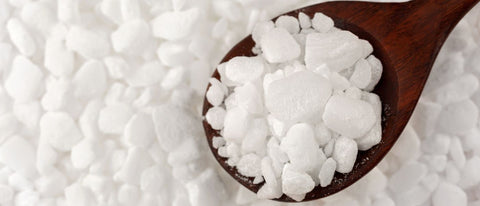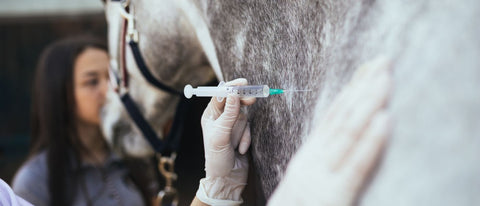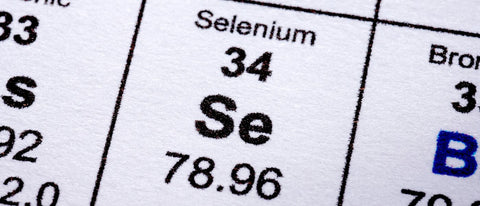
Florian ist aufgewachsen auf einem Bauernhof. Umgeben von Pferden, entdeckte er früh seine Faszination für diese majestätischen Tiere. Inspiriert von seiner reitbegeisterten Mutter, entwickelte er das Nahrungsergänzungmittel - Pferdegold. Seine tiefe Verbundenheit zur Natur und die leidenschaftliche Hingabe zu Pferden trieben ihn an, sein Unternehmen zu gründen.
Horses are not only elegant and powerful creatures, but also sensitive animals that require careful care and attention.
A crucial aspect of their health and well-being is a balanced diet.
Magnesium can play a central role for the horse here.
This mineral is essential for the nerve and muscle functions of horses and can help them meet the daily demands of both sport and everyday life.
Whether as leisure companions or at competitions, horses are often exposed to high levels of stress.
An adequate supply of high-dose magnesium can help maintain and promote your nerve strength and performance.

The 10 most important reasons why magnesium is essential for horses
Magnesium plays an essential role in the performance of horses.
Its diverse functions and the effects of magnesium make it a true “key mineral” .
Here are the top ten reasons why magnesium is so crucial for horses:
-
Muscle and nerve function: Magnesium is essential for muscle relaxation and the transmission of nerve impulses. A deficiency in this mineral can cause horses to become nervous and restless.
-
Energy metabolism: Another aspect of magnesium's effect is its role in the energy metabolism of cells, which can be crucial for physical performance.
-
Bone and heart health: Magnesium supports the development and maintenance of bones and even influences the regulation of heart rhythm.
-
Stress management: Magnesium can be particularly helpful in stressful situations as it can contribute to muscle relaxation and normal nerve function.
-
Muscular problems: The effects of magnesium also include supporting muscle contraction and relaxation, which can counteract muscle tension, cramps, and muscle pain.
-
Feeding-related deficiency: Since hay, straw and grass are often insufficient as a source of magnesium for horses, additional supplementation may be necessary.
-
Support in case of illness: Certain illnesses can increase the horse's magnesium requirements, so an additional dose may be useful.
-
Life-phase-dependent requirements: The need for magnesium varies depending on the horse's life phase, which underlines its versatile effect.
-
Individual needs: Magnesium requirements vary from individual to individual and depend on factors such as training and physical condition.
-
Natural sources: Various natural sources such as flaxseed and wheat bran can help meet magnesium needs in horses.
Adequate magnesium tryptophan levels can promote calm and balance, which can be particularly important for horses prone to stress.

Perfect for your horse: Pferdegold® supplementary feed!
These specially developed supplements support your horse's diet and provide it with natural nutrients. Made in Germany, grain-free and drug-free, they come with a 30-day money-back guarantee.
Try it now!Muscular relaxation through the effect of magnesium
Magnesium is an essential mineral for horses and its effect contributes significantly to muscle relaxation.
This process, also known as muscle relaxation, is crucial for reducing tension and cramps.
Magnesium helps maintain a balance between muscle contraction and relaxation.
It works closely with calcium and acts as a natural calcium channel blocker, meaning it regulates the movement of calcium ions in muscle cells, thus supporting muscle relaxation.
This balance is essential for healthy muscle activity and can be particularly important after intense physical exertion such as training or competitions.
Magnesium can occur in different forms, such as
- Magnesium oxide,
- Magnesium carbonate,
- Magnesium fumarate or
-
Magnesium stearate.
The different forms of magnesium not only support muscle recovery, but are also involved in oxygen supply and muscle strength.
Magnesium contributes to improving these metabolic processes in horses. Magnesium also has a calming effect and can help relieve muscle tremors and nervousness.
The macronutrient brings harmony to muscles and nerves
Magnesium is not only important for muscle relaxation, but also for signal transmission between nerve cells and muscles.
Through its function as a calcium antagonist, magnesium harmonizes neuromuscular impulse transmission and muscle contractions.
This leads to improved coordination and the magnesium effect reduces the excitability of muscles and nerves.
Magnesium is also an activator of numerous enzymes that are important for the entire metabolism and contributes to muscle formation.
A magnesium deficiency can lead to tension, anxiety and increased nervousness, which can often be positively influenced by magnesium supplementation in horses.

Magnesium deficiency in horses: These are typical symptoms
A magnesium deficiency in horses can often go unnoticed because its symptoms are considered " silent complaints ."
These usually only become visible when the horse does not consume enough magnesium over a longer period of time.
A deficiency in this important mineral can have a significant impact on the horse's mood and performance.
Possible symptoms of magnesium deficiency include:
- Fatigue, poor sleep
- Stress, nervousness
- Muscle cramps or tremors
- Hard muscles, muscle pain
- Difficulty concentrating, severe distraction while riding
- Difficulty in cantering or incorrect cantering
- Susceptibility to injury
- Demineralization of bones
- Insulin resistance, EMS (equine metabolic syndrome)
- Osteoarthritis
It is important to pay attention to these symptoms as they could indicate a possible magnesium deficiency.
In many cases, supplementary feed and adapted feeding can help to compensate for such a deficiency.

The importance of the trace element in feeding
Magnesium is an essential mineral for horses that plays a central role in many bodily functions, including muscle and energy metabolism .
Adequate magnesium levels are crucial for energy processing, muscle development and the horse's general well-being.
It also influences mood and supports fat and carbohydrate burning. Therefore, it is important to consider magnesium requirements in horses' daily feeding.
Supplementing magnesium: These are the 3 tips you should keep in mind!
When supplementing magnesium, it is important to consider the horse's individual needs. These can vary and depend on various factors, such as the horse's age , health , and physical activity level .
➽ Tip 1: Choose the right form and dosage of magnesium to suit your horse's specific needs and activities.
➽ Tip 2: Make sure your magnesium supplement is easily absorbed. A combination of different forms of magnesium can prove beneficial.
➽ Tip 3: Monitor your horse's response to magnesium supplementation and adjust the dosage as needed. Pay attention to any changes in your horse's behavior or well-being.
When supplementing magnesium, it is important to find a balance and avoid overdosing, as this can lead to digestive problems.
However, overdose is rare, as excess magnesium is usually simply excreted.
How much magnesium does a horse need daily?
A horse's daily magnesium requirement varies depending on size, age, pregnancy, lactation and workload.
In general, adult horses need between 10 and 12 grams of magnesium daily.
Feeding should be designed to meet the horse's magnesium needs. Average-quality hay contains about 0.8 grams of magnesium per kilogram.
With a daily hay feeding of about 9 kilograms, a magnesium intake of about 7.2 grams is achieved, which does not correspond to the recommended daily amount.
Other sources of magnesium can be oats, corn, straw, flaxseed and wheat bran.
In many cases, it may be useful to add a special supplementary feed to adequately cover the magnesium requirement.
It should also always be noted that not all of the magnesium contained in the feed is usually absorbed by the horse's body.

Pferdegold® supplementary feed!
Pferdegold is a small family business from Bavaria with a big dream: to produce the best horse feed. We see ourselves as a family of equestrians who want to provide your horse with the ideal nutrition. 100% natural and perfectly tailored to your horse's needs.
Try it now!Horse power and magnesium: In these cases the need increases
A horse's magnesium requirements can vary depending on different circumstances.
Here are some situations in which the need for magnesium in horses may increase:
-
Increased activity: During intensive training or competition, magnesium consumption increases because horses lose more minerals and therefore also magnesium when they sweat.
Sport and competition horses, which are often subjected to high physical stress, therefore have an increased need for magnesium.
-
Stressful situations: Stressful circumstances such as transport, changing stables or participating in competitions can increase a horse's magnesium requirements.
Magnesium can help calm the nervous system and reduce stress-related behavior.
-
Health problems: Certain diseases such as equine metabolic syndrome (EMS) or Cushing's disease can result in an increased need for magnesium.
In such cases, additional magnesium supplementation can have positive effects, but should be discussed with a veterinarian.
-
Life-stage-dependent requirements: Magnesium requirements vary depending on the horse's life stage. Foals need magnesium for growth, while older horses depend on it to maintain their vitality. The requirement is also increased in pregnant or lactating mares.
- Nutritional factors: Magnesium deficiency can also result from an unbalanced diet, for example if horses do not have access to fresh grass or their feed is generally low in magnesium.
What happens if there is an excess of the mineral?
When supplementing magnesium with your horse, it's important to find the right balance. Although rare, an excess of this essential mineral can lead to certain side effects.
Excess magnesium is usually excreted efficiently in the urine , minimizing the risk of accumulation in the horse's body.
However, very high doses that far exceed the required amount can cause digestive problems such as diarrhea .
This underlines the importance of an adjusted magnesium intake .
An excess, although less dangerous than a deficiency, can still have undesirable effects.
It is therefore advisable to determine the magnesium dosage in consultation with a veterinarian or a horse nutrition expert in order to avoid both deficiency and excess.

Conclusion
It is no exaggeration to say that in the world of mineral nutrition for horses, the mineral magnesium plays a major role.
It not only supports muscles and nerves, but also the general well-being of your faithful companion.
Adequate magnesium levels can promote calm and balance, which can be particularly important for horses prone to stress.
An adequate supply of magnesium can therefore be an important building block for a happy and efficient horse.
FAQ
Which magnesium sources are suitable for horses?
In addition to special supplementary feed, hay, oats, linseed or wheat bran can be natural sources of magnesium.
It is important to maintain a balanced diet to meet your magnesium needs.
Do older horses need more magnesium?
Older horses may have an increased need for magnesium because their ability to absorb minerals may decrease.
In addition, sufficient magnesium levels help prevent age-related problems such as muscle stiffness and joint problems.
An adapted supplement is therefore recommended.
How does magnesium affect the behavior of horses?
Magnesium can have a positive effect on the behavior of horses, especially in cases of stress and nervousness.
It helps calm you down and can help increase your resistance to stress.
Can magnesium supplements help with muscle recovery?
Magnesium supplements can support muscle recovery because magnesium plays a key role in muscle relaxation and regeneration.
It can help reduce muscle cramps and pain after intense activity.
IMPORTANT:
Pferdegold is not a substitute for veterinary diagnosis or treatment . The information contained in this article is for general informational purposes only and is intended to help improve your horse's well-being.
Pferdegold products do not treat or cure diseases , but rather support your horse in correcting nutritional deficiencies through targeted nutrient intake. However, they are not a substitute for professional advice from a veterinarian or specialist.
If your horse has any health problems , we strongly recommend consulting a veterinarian . Pferdegold assumes no liability for decisions made based on the information provided here.
Learn more about horse health and read the next guides!
















